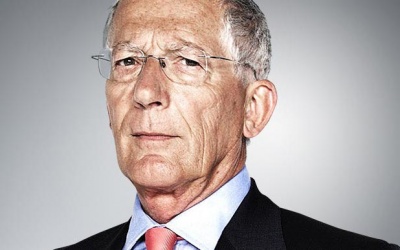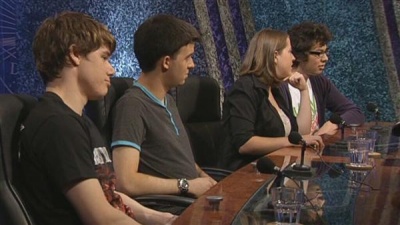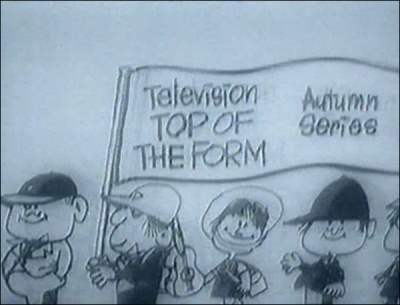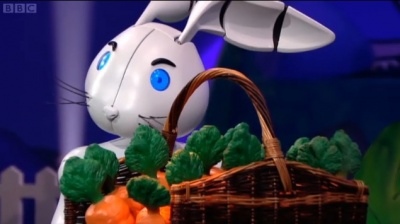Weaver's Week 2012-03-11
Last week | Weaver's Week Index | Next week
Four shows under review this week, and they've been on air for (roughly) 170 years between them.
Contents |
Countdown
YTV for Channel 4, since 1982
We've been holding off on this review for a little while now, buying more time while we attempt to make up our minds. What do we make of Nick Hewer on Countdown?
To be absolutely fair, we've discarded everything that happened in January. Our suspicion is that Mr. Hewer was a relatively late appointment, and while he won't have come in completely cold, he clearly didn't have much practice before starting properly.
What can we tell about Mr. Hewer? He has a very dry wit, and has the ability to make entertaining one-liners without breaking his deadpan face. It's clear that he's intellectually astute, perhaps the most literate host since the sainted Richard Whiteley of Wetwang. Particularly in the opening minutes of the show, while introducing everyone else, Mr. Hewer has a brief opportunity to shine, and takes it.
Each host casts the game in his image – Des O'Connor (2007-8) made the show feel older than many of its contestants, Jeff Stelling (2009-11) brought back youthful vigour and something of an obsession with sport. Under Nick Hewer, we're finding Countdown feels that little bit more conservative, slightly less tolerant of diversity. The host knows the words he knows, and doesn't welcome neologisms. Language changes, words are coined, other words become archaic and are relegated to the dusty tomes of the Twenty Volume Oxford English Dictionary. His opening monologues are competing for populism with Little Noely of that other show no-one watches: saying that "sportsmanship should be brought back", railing against train managers, that sort of thing.
We're also finding that Countdown is a bit more starchy. Though the hosts have always been well turned-out, Nick Hewer is all polished suit and not a hair out of place. There's nothing terribly wrong with this, it's just not what we've come to expect from a cosy little parlour game. Richard made us feel at home, Jeff made us feel like we were eavesdropping in a pub, Nick feels like he's leading a lecture.
But let's be fair. Nick has some expressive mannerisms, able to convey many things just from the look on his face. His humour tends to be against himself, and one of his soliloquies was in praise of young people. And he seems to be entirely unflappable, as demonstrated in just his second week in the job, when someone offered an anagram of WANERK. Brushed it off like it's an everyday occurrence.
Most importantly, Nick Hewer knows that he's not the star of the show. He leaves that to the contestants, and it's clear there's been a very subtle shift in casting. Contestants are still picked from being good at the game, but also from being decent on screen. We've had fewer youngsters who spend all night every night learning anagrams of disengage, and more contestants of slightly more advanced years. Let's be honest, more contestants with whom the audience will identify.
So, who are the contestants? Or at least the winning ones? Jack Worsley was the carry-over champion from last year, and he turned out to be a quality octochamp, scoring 818 points in his eight wins. Mark Murphy won five games, scoring a total of 454; he was good but overshadowed by the previous champion. Sri Gutta won two games, and was perhaps unlucky to lose to Susan Hughes. She lost her first defence, allowing Neil Hewitt to start a three-game winning run – his total was 304 points.
Jocelyn Menyhart won two games in early February, before yielding to Victoria James. She had six wins, a total of 567, and looked to be on octochamp form until suddenly crumbling. Chris Rose took advantage, but promptly lost to Chris Butler. Three wins (362 pts) from a very strong contender, but he had the misfortune to come up against the even better Peter Lee. He managed eight wins and a total of 801 points. Since then, Anthony White won one match, Ben Rollett two, Michael Taiwo three, and Gerri Kostrzewa one win. That's one win on Countdown: releasing Pulp's first single makes her a hero to at least one UKGS contributor.
Brain of Britain
BBC Radio 4, since AD 52
Running since just after the Roman invasion, Brain of Britannia was hosted for many years by Robert Robinson, and latterly hosted by Russell Davies. Contenders in this week's final were Ian Clark, Rob Merrill, Rob Milnes, and Ray Ward.
Ian Clark – contenders are now generally called by their full name – kicks off with a couple of questions on his own turn, but yields a point on a bonus afterwards. Rob Merrill also gets his first question right, Rob Milnes a couple, but again drops the baton. If a contender is able to score five correct answers in a row, they score a bonus point and their turn ends. Ray Ward also gets two on his own turn, but yields a point. At the end of the first round, just one point covers all the players.
Welcome to the final! One for Ian Clark, everyone else drops his opener, some bonuses are awarded, and still one point covers all the players. This being the final, the questions are that little bit tougher than we might have heard earlier, and it's no tremendous surprise that no player scores more than a couple on their own round. Robert Merrill pulls out a guess that alabaster took its name from a city in Egypt, a point that might prove very useful at the end – it's enough for him to take the lead.
Russell Davies is able to add in some asides – "the smaller the critter, the bigger the name" has a ring of truth – and guides the players through Beat the Brains. This week's pair have been set by outgoing champion Iwan Thomas, who reminds the world that a patent for the nuclear-powered flying saucer is held by British Rail. The craft to the Moon is delayed by asteroids on the line.
Every episode of Brain of Britain contains two audio questions, the first asking for the names of the members of Wham! Ray Ward is able to recall they were Yog and The Other One. None of the starters in this round is answered correctly, but bonuses have allowed Rob Merrill to extend his lead to a princely two points. Another round contains but one correct answer, but entertaining discussions of tennis players of the 1920s, and experiments in behavioural science. The answer fell to Ray Ward, closing the gap at the top.
Another round, and Ray Ward profits as Rob Merrill is confused by the replica Eleanor Cross in a central London station. Another bonus, and a correct answer on his own starter, and suddenly it's Ray Ward leading by two. Rob Merrill gets his starter, but only the one question. The second audio question is commentary of Adrian Moorhouse winning Olympic gold, but when Ray Ward drops his starter, it falls to Ian Clark, who has suddenly moved level in second place, one behind Ray Ward.
The final round looms. Ian Clark gets his starter wrong, and it's not picked up by anyone. Rob Merrill drops his starter, which falls to Rob Milnes. That contender fails on his starter, Ray Ward takes the bonus, and though he fails on his first question as well, Ray Ward has won with 10 points, just two and three clear of the other contenders. He's awarded his prize of a glass bowl, a moment that really works well on radio, and Brain of Britain is over for another year. It wouldn't be the same without it.
University Challenge
Actual Semi-Final 1: Worcester Oxford v Manchester
Worcester's qualifying victory came against UCL way back on 23 January; Manchester got here after beating Clare Cambridge two weeks back. Manchester get the first starter, but don't do too well on the bonuses, about English kings prior to the Conquest. They do well on schools of economic thought, and sufficiently well to keep Worcester off the scoreboard until the first visual round. They also manage to keep the score down by conferring forever on their bonuses.
The visual round has the teams reading definitions of dictionary words appearing in close proximity in an English dictionary, and their task is to give the words. Of one set, the only one Manchester gets is "Vindaloo". Thumper is moving them on quite quickly, the lead is 70-0. Tedious edit wars from That Other Wiki manage to form a set of bonuses, and The Manchurian Candidate allows Manchester to bring up their century. Thumper reckons it's Game Over, telling Worcester that there's plenty of time. There's never plenty of time!
Manchester gets a set of bonuses about the roots of polynomial functions, which is about as welcome as root canal work. Something highly unusual happens on the music starter – at the eleventh time of asking, someone from Worcester Oxford actually buzzes with an answer. They're wrong, so are Manchester, and the score of 115-0 is as one-sided as it sounds. Worcester do get the next starter, qualifying them for the audio round – on works inspired by Faust – but promptly lose half those points through a missignal. A further missignal on the next question brings the side down to the grand non-total of nothing. Manchester are doing well on philosophers, and even know the photographer who photographed nudes there and in Salford. Why should they know about Manchester, they only study there!
"Lemmings!" shouts Manchester, though not when asked for their favourite computer game. They go on to score lightly on US geography, and with no-one getting the visual starter about the fall of Constantinople, Manchester's lead is 185-0. At 21 minutes and 44 seconds into the show, and at the fourth attempt, Worcester manages to get a bonus question correct. But just the one. They go on to get the next starter, and score well with spelling using chemical elements. "Coughing" beings Worcester up to 50 points, and is there really time for them to come back and win this? Not if they fail on questions about scrofula.
Manchester pull further ahead with National Parks, knowledge of various things called "Luxembourg", and words that can be formed from the letters of "lyrical". Such as "berry". Have they been taking lessons from UCL? A river that rhymes with "Bennett"? The Kennet, obviously. Worcester may be the "wurst" team we've seen this week, but that starter still means they're better than many we've seen this series.
But Manchester has the win, 240-65. It wasn't a classic game, over as a contest very early on. The sides combined for 43/82 questions, the surest sign of a one-sided competition.
Next match: Pembroke Cambridge v UCL
Mastermind
Heat 21
Enjoy the single episodes while they last: the last two heats will air back-to-back on 23 March. That's except for viewers in Wales, and they saw this one at 7pm Saturday.
Nick Duffy begins tonight's show, taking the Life and Career of Peter Cook (1937-95). A pioneer of modern satire, Cook went through Footlights Cambridge to create the revue Beyond the Fringe, which dared to poke fun at prime minister Harold Macmillan. He set up a club called "The Establishment" and revived the fortunes of Private Eye. He worked mostly with Dudley Moore, but when he died there was a suggestion that he hadn't fulfilled his promise. No such claim about this round, 13 (0). Cook Moore: the best of Peter Cook and Dudley Moore*.
Chris Shepherd is next up, he'll tell us about French Impressionists 1863-1890. Impressionist painting tends to portray the impression of the scene, and uses small strokes of unmixed colours, attempting to portray the light and shades. Masters of their art included Claude Monet, Cézanne, Paul Gauguin, Degas, Pissaro. But not Picasso, he was Spanish. The round starts well, but falls into something of a pass spiral. 6 (5). Impress more: The French Impressionists (1860-1900) by Camille Mauclair.
Michael Rogers is discussing Haydn in England. Haydn (1732-1809) spent about four years in London, where he composed twelve symphonies. Well-known works from this era include the Clock, Surprise, and London symphonies, and the Gypsy Rondo piano work. 10 (4) is the final score. Compose more: some of Haydn's London works*.
And finally, it feels wrong to be writing "and finally" at 8.11. Duncan Stephenson will tell us something of the History of FC Barcelona (est 1984). A founder member of the Spanish League in 1988, and the Super League in 2001, Barcelona has met with some success, winning the national cup competition in 1994 and 2011. Star players include Rubio and Cubí. None of this makes the show, because the contender has been asked questions about the men's team, about which we know nothing and care less. The score is 9-2, which apparently is the sort of result the men get against sides like Bayer Leverkusen. Whoever they are. Support more: The People's Passion by Jimmy Burns*.
Chris Shepherd is back in the chair, and though he confuses the Duke of Cambridge with the Duke of York, he still gets to run up the score by a few points before entering another spiral of passes and errors. The contender keeps plugging away, and even when he's wrong – suggesting Labrador for the Dalmatian dog – we can see his logic. 14 (9).
Duncan Stephenson begins with Beatrix Potter, the bongos, and the Order of the Garter. Will he remember Top of the Form? Of course he will, and will we ever see a similar show again? A lyric from the Boomtown Rats, the interior angles of a quadrilateral, and the career of Simon de Montfort, all help to advance his score to 20 (5). A quality effort.
Michael Rogers begins with questions about King Midas and diamonds. Wonder if the question-setters are trying to tell us something? There are a lot of very logical guesses – Tolstoy rather than Lenin for a question about the Russian Revolution – on most of which the contender zags when he should zig. The final score is 18 (12).
Which means Paul Smith will come back as a high-scoring runner-up. Nick Duffy needs eight correct answers to join him, beginning with John McEnroe and the Numberplace puzzle. No, that's not Numberwang. The battle of Bosworth Field, the Millennium Bug, Andrew Flintoff's cricket county, and Lady Windemere's Fan, and that's the game won. But the round continues, plugging The Apprentice You're Fired, The Old Grey Whistle Test, and (in a nod to last week's show) the satires of William Hogarth. It's a tremendous performance, this contender has epic general knowledge. 31 (0) the final, with 17 (seventeen) in the second round.
This Week And Next
Yes, we knew that Ortis Deley was able to appear on Let's Dance for Sport Relief because he had been replaced as the host of Channel 4's athletics coverage. We're not entirely sure why he should have been replaced, it's an event run by people who clearly have no idea what makes good sport or how to ensure a decent competition. Channel 4 has already lost the rights for the next round, and we think they might have given up trying already.
In other news, Channel 4 has found some bits on the DTTV stream, and will start Channel 4's fifth channel, 4-7. According to the press office, this will feature "all the best Channel 4 shows from the last week, based on what people are saying on social media". This is excellent news, finally we get Countdown in prime-time, and Channel 4 News From Six Days Ago. The real reason is that Channel 4 is showing almost 10% fewer commercials to its preferred audience of people between 16-34, and is looking for any excuse to help them watch The Million Pound Drop and The Mad Bad Had It Show. It's almost as if they forget that Big Brother was perfect to bring in young people.
Another fortnight, another OFCOM report. This one looks into The X Factor from last October, when Frankie Cocozza let fly with a well-known F-word on the results show. The regulator's problem wasn't so much that he had used foul language, but that no-one from The X Factor organisation was watching the show as it was broadcast. Had there been, Dermot would have apologised, and nothing more would have happened. As we see it, the fault is yet another failure of The X Factor's compliance procedures, and they've averaged very nearly one failure per series.
Last year's breaches won't include a finding about drugs and smoking from the same programme. We suggested last year Frankie Cocozza was fired for possibly bringing up an adverse regulatory finding, and this hasn't happened – the swearing appears to us to be a back-room failure. That hasn't now happened, and we wonder if Cocozza now has to have a one-off sing-off against Pick 'n' Mix.
Complaints about the inability of The Facebook to handle the number of Big Brother voters have been deemed "resolved". Unspent credits for the 2011 series could be refunded or used in the Celebrity Big Brother series in January, and the developers "increased sevenfold" the number of computers available to handle voting. Complaints about voting in the January series have been rejected, as have complaints about Playing it Straight being scheduled for Saturday mornings on Channel 4.
News as unsurprising as it is regrettable: ARMTV of Armenia will not send an entry to this year's Eurovision Song Contest, to be held in Baku in late May. There has been bad feeling between the two countries for pretty much as long as they've been two countries. Back home, the Daily Mail claimed that the BBC had been "swamped" with complaints after naming Engleberg Humperlump as their entry. The actual number of complaints: three.
Normal service resumed in the week to 26 February, as Dancing on Ice took the most-seen slot, 7.25m was comfortably ahead of Let's Dance for Sport Relief (5.8m) and Masterchef (a year's best 5.4m). Who Dares Wins took 5.3m, Take Me Out 5.15m, and Pointless Celebrities (4.95m) comfortably beat Family Fortunes (4.1m). University Challenge was top of BBC2's pile, with 3.05m seeing the game, and Come Dine With Me topped Channel 4's cake, 1.75m. Still leaves it behind Celebrity Juice, naturally, 2.5m viewers on Thursday. Take Me Out The Gossip was seen by 965,000, and Got to Dance fell away to 765,000. Over on Challenge, repeats of Millionaire are doing the business, 205,000 saw Tuesday's show.
Coming up this week, finals week on Masterchef (BBC1, 9pm Tue-Thu). A new weekday quiz on BBC2, Breakout with Nick Hancock (4.30). Sport Relief does Glee Club returns (CBBC, 4.30 weekdays), as does Four in a Bed (C4, 5.30 weekdays). The 3rd Degree is back (Radio 4, 3pm Monday), as is Never Mind the Buzzcocks (BBC2, 10pm Tues). Saturday has a retrospective of Just a Minute (Radio 4 Extra, 9am and 7pm). UKTV Living gets The Love Machine (6pm Sunday), and Sky 3 adds repeats of Deal or No Deal (2pm weekdays). For viewers in Ireland, a new run of Dragons' Den (RTÉ1, 9.30 Sunday); for viewers who find Paxman too intimidating, there's Whisker Wars (ITV, 8pm Monday) about competitive beard growing.
Links marked with a * help support the UKGameshows servers.
To have Weaver's Week emailed to you on publication day, receive our exclusive TV roundup of the game shows in the week ahead, and chat to other ukgameshows.com readers, sign up to our Yahoo! Group.





